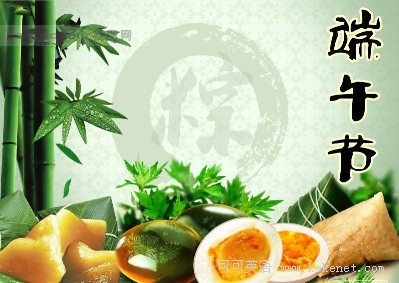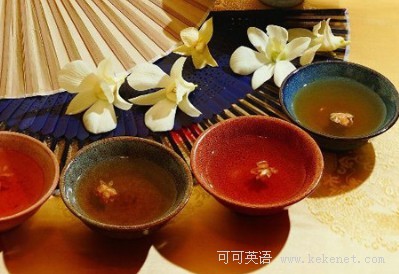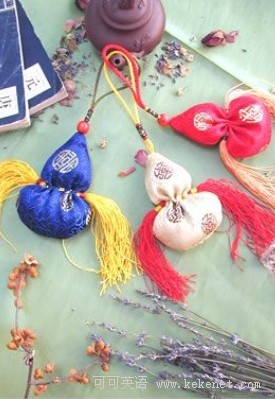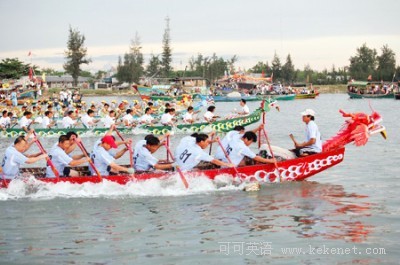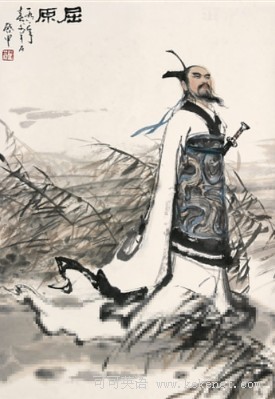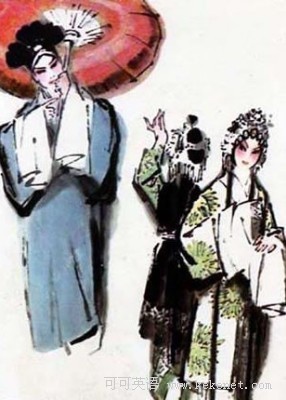(单词翻译:单击)
端午的前世今生
The Dragon Boat Festival, the 5th day of the 5th lunar month, has had a history of more than 2,000 years. It is usually in June in the Gregorian calendar.
端午节是古老的传统节日,始于中国的春秋战国时期,至今已有2000多年历史。
There are many legends about the evolution of the festival, the most popular of which is in commemoration of Qu Yuan (340-278 BC). Qu Yuan was minister of the State of Chu and one of China's earliest poets. In face of great pressure from the powerful Qin State, he advocated enriching the country and strengthening its military forces so as to fight against the Qin. However, he was opposed by aristocrats headed by Zi Lan, and later deposed and exiled by King Huai.
据《史记》“屈原贾生列传”记载,屈原,是春秋时期楚怀王的大臣。他倡导举贤授能,富国强兵,力主联齐抗秦,遭到贵族子兰等人的强烈反对,屈原遭馋去职,被赶出都城,流放到沅、湘流域。
In his exiled days, he still cared much for his country and people and composed immortal poems including Li Sao (The Lament), Tian Wen (Heavenly Questions) and Jiu Ge (Nine Songs), which had far-reaching influences. In 278 BC, he heard the news that Qin troops had finally conquered Chu's capital, so he finished his last piece Huai Sha (Embracing Sand) and plunged himself into the Miluo River, clasping his arms to a large stone.The day happened to be the 5th of the 5th month in the Chinese lunar calendar.
他在流放中,写下了忧国忧民的《离骚》、《天问》、《九歌》等不朽诗篇,独具风貌,影响深远(因而,端午节也称诗人节)。公元前278年,秦军攻破楚国京都。屈原眼看自己的祖国被侵略,心如刀割,但是始终不忍舍弃自己的祖国,于五月五日,在写下了绝笔作《怀沙》之后,抱石投汨罗江身死,以自己的生命谱写了一曲壮丽的爱国主义乐章。
After his death, the people of Chu crowded to the bank of the river to pay their respects to him. The fishermen sailed their boats up and down the river to look for his body. People threw into the water zongzi (pyramid-shaped glutinous rice dumplings wrapped in reed or bamboo leaves) and eggs to divert possible fish or shrimp from attacking his body. An old doctor poured a jug of reaglar wine (Chinese liquor seasoned with realgar) into the water, hoping to turn all aquatic beasts drunk. That's why people later followed the customs such as dragon boat racing, eating zongzi and drinking realgar wine on that day.
传说屈原死后,楚国百姓哀痛异常,纷纷涌到汨罗江边去凭吊屈原。渔夫们划起船只,在江上来回打捞他的真身。有位渔夫拿出为屈原准备的饭团、鸡蛋等食物,“扑通、扑通”地丢进江里,说是让鱼龙虾蟹吃饱了,就不会去咬屈大夫的身体了。人们见后纷纷仿效。一位老医师则拿来一坛雄黄酒倒进江里,说是要药晕蛟龙水兽,以免伤害屈大夫。后来为怕饭团为蛟龙所食,人们想出用楝树叶包饭,外缠彩丝,发展成棕子。
Dragon boat racing is an indispensable part of the festival, held all over the country. As the gun is fired, people will see racers in dragon-shaped canoes pulling the oars harmoniously and hurriedly, accompanied by rapid drums, speeding toward their destination. Folk tales say the game originates from the activities of seeking Qu Yuan's body, but experts, after painstaking and meticulous research, conclude that dragon boat racing is a semi-religious, semi-entertaining program from the Warring States Period (475-221 BC). In the following thousands of years, the game spread to Japan, Vietnam and Britain as well as China's Taiwan and Hong Kong. Now dragon boat racing has developed into an aquatic sports item which features both Chinese tradition and modern sporting spirit. In 1980, it was listed into the state sports competition programs and has since been held every year. The award is called "Qu Yuan Cup."
賽龙舟,是端午节的主要习俗。相传起源于古时楚国人因舍不得贤臣屈原投江死去,许多人划船追赶拯救。他们争先恐后,追至洞庭湖时不见踪迹。之后每年五月五日划龙舟以纪念之。借划龙舟驱散江中之鱼,以免鱼吃掉屈原的身体。竞渡之习,盛行于吴、越、楚。 其实 ,“龙舟竞渡”早在战国时代就有了。在急鼓声中划刻成龙形的独木舟,做竞渡游戏,以娱神与乐人,是祭仪中半宗教性、半娱乐性的节目。后来,赛龙舟除纪念屈原之外,在各地人们还付予了不同的寓意。此外,划龙舟也先后传入邻国日本、越南等及英国。1980年,赛龙舟被列入中国国家体育比赛项目,并每年举行“屈原杯”龙舟赛。
Zongzi is an essential food of the Dragon Boat Festival. It is said that people ate them in the Spring and Autumn Period (770-476 BC). In early times, it was only glutinous rice dumplings wrapped in reed or other plant leaves and tied with colored thread, but now the fillings are more diversified, including jujube and bean paste, fresh meat, and ham and egg yolk. If time permits, people will soak glutinous rice, wash reed leaves and wrap up zongzi themselves.Otherwise, they will go to shops to buy whatever stuff they want. The custom of eating zongzi is now popular in North and South Korea, Japan and Southeast Asian nations.
端午节吃粽子,这是中国人民的又一传统习俗。粽子,又叫“角黍”、“筒粽”。其由来已久,花样繁多。 据记载,早在春秋时期,用菰叶(茭白叶)包黍米成牛角状,称“角黍”;用竹筒装米密封烤熟,称“筒粽”。一直到今天,每年五月初,中国百姓家家都要浸糯米、洗粽叶、包粽子,其花色品种更为繁多。从馅料看,北方多包小枣的北京枣粽;南方则有豆沙、鲜肉、火腿、蛋黄等多种馅料,其中以浙江嘉兴粽子为代表。吃粽子的风俗,千百年来,在中国盛行不衰,而且流传到朝鲜、日本及东南亚诸国。
On Dragon Boat Festival, parents also need to dress their children up with a perfume pouch. They first sew little bags with colorful silk cloth, then fill the bags with perfumes or herbal medicines, and finally string them with silk threads. The perfume pouch will be hung around the neck or tied to the front of a garment as an ornament. They are said to be able to ward off evil.
端午节小孩佩香囊,传说有避邪驱瘟之意,实际是用于襟头点缀装饰。香囊内有朱砂、雄黄、香药,外包以丝布,清香四溢,再以五色丝线弦扣成索,作各种不同形状,结成一串,形形色色,玲珑可爱。
端午习俗之饮雄黄酒
Ancient folk medicines(民间药物) such as realgar(雄黄酒)are added to the food eaten on the Festival day. This is believed to prevent disease and to promote a healthy digestive system(消化器官). The drinking of realgar in wine supposedly relieves(解除) the effects of poisons accumulated in human bodies.
饮雄黄酒:雄黄本属矿物, 含有三硫化砷成分,与酒混合。即成雄黄酒,用以驱虫解五毒,小儿涂于头额。耳鼻,手足心。 并洒墙壁问, 以法诸毒。流传民间之《白蛇传》故事,即是以雄黄酒解蛇虺诸毒,而现白蛇原形。此种习佰,在长江流域地区的人家很盛行。
端午习俗之吃粽子
Zongzi is an essential food of the Dragon Boat Festival. It is said that people ate them in the Spring and Autumn Period (770-476 BC). In early times, it was only glutinous rice dumplings wrapped in reed or other plant leaves and tied with colored thread, but now the fillings are more diversified, including jujube and bean paste, fresh meat, and ham and egg yolk. If time permits, people will soak glutinous rice, wash reed leaves and wrap up zongzi themselves. Otherwise, they will go to shops to buy whatever stuff they want. The custom of eating zongzi is now popular in North and South Korea, Japan and Southeast Asian nations.端午节吃粽子,这是中国人民的又一传统习俗。粽子,又叫“角黍”、“筒粽”。其由来已久,花样繁多。据记载,早在春秋时期,用菰叶(茭白叶)包黍米成牛角状,称“角黍”;用竹筒装米密封烤熟,称“筒粽”。一直到今天,每年五月初,中国百姓家家都要浸糯米、洗粽叶、包粽子,其花色品种更为繁多。从馅料看,北方多包小枣的北京枣粽;南方则有豆沙、鲜肉、火腿、蛋黄等多种馅料,其中以浙江嘉兴粽子为代表。吃粽子的风俗,千百年来,在中国盛行不衰,而且流传到朝鲜、日本及东南亚诸国。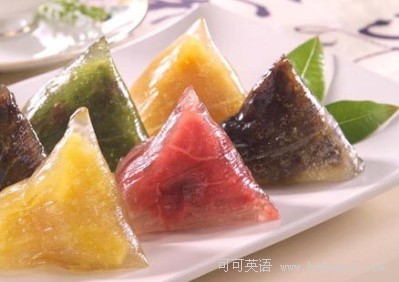
端午节习俗之佩戴香包
On Dragon Boat Festival, parents also need to dress their children up with a sachet. They first sew little bags with colorful silk cloth, then fill the bags with perfumes or herbal medicines(草药), and finally string them with silk threads. The sachet will be hung around the neck or tied to the front of a garment as an ornament. They are said to be able to ward off evil.
端午节最有特色的饰物就是香包(sachet)。小孩佩戴香包,传说有避邪驱瘟之意。用含有多种香味的药用植物做成的香包也可以预防疾病。
The sachets (Hsiang Pao in Chinese香包) are very popular with children and they vie(竞争) with each other to collect as many as possible. Children are not the only ones who collect Hsiang Pao. Older people are often given them as a symbol of respect, and they are highly prized because of the intricate(复杂的) and beautiful embroidery(刺绣) that adorns(装饰) them.
端午节小孩佩香囊,不但有避邪驱瘟之意,而且有襟头点缀之风。香囊内藏有朱砂。 雄黄。香药, 外包以丝布,清香四溢, 再以五色丝线弦扣成索,作各种不同形状,结成一串,形形色色,玲珑夺目。
端午节习俗之赛龙舟
Dragon boat racing is an indispensable part of the festival, held all over the country. As the gun is fired, people will see racers in dragon-shaped canoes pulling the oars harmoniously and hurriedly, accompanied by rapid drums, speeding toward their destination.
Dragon boat racing is an indispensable part of the festival, held all over the country. As the gun is fired, people will see racers in dragon-shaped canoes pulling the oars harmoniously and hurriedly, accompanied by rapid drums, speeding toward their destination. Folk tales say the game originates from the activities of seeking Qu Yuan's body, but experts, after painstaking and meticulous research, conclude that dragon boat racing is a semi-religious, semi-entertaining program from the Warring States Period (475-221 BC). In the following thousands of years, the game spread to Japan, Vietnam and Britain as well as China's Taiwan and Hong Kong. Now dragon boat racing has developed into an aquatic sports item which features both Chinese tradition and modern sporting spirit. In 1980, it was listed into the state sports competition programs and has since been held every year. The award is called "Qu Yuan Cup."
“鼓声三下红旗开,两龙跃出浮水来。棹影斡波飞万剑,鼓声劈浪鸣千雷。”端午节最应景的节目就是赛龙舟。
賽龙舟,是端午节的主要习俗。相传起源于古时楚国人因舍不得贤臣屈原投江死去,许多人划船追赶拯救。他们争先恐后,追至洞庭湖时不见踪迹。之后每年五月五日划龙舟以纪念之。借划龙舟驱散江中之鱼,以免鱼吃掉屈原的身体。竞渡之习,盛行于吴、越、楚。
其实 ,“龙舟竞渡”早在战国时代就有了。在急鼓声中划刻成龙形的独木舟,做竞渡游戏,以娱神与乐人,是祭仪中半宗教性、半娱乐性的节目。后来,赛龙舟除纪念屈原之外,在各地人们还付予了不同的寓意。此外,划龙舟也先后传入邻国日本、越南等及英国。1980年,赛龙舟被列入中国国家体育比赛项目,并每年举行“屈原杯”龙舟赛。
端午节传说之屈原投江
There are many legends about the evolution of the festival, the most popular of which is in commemoration of Qu Yuan (340-278 BC). Qu Yuan was minister of the State of Chu and one of China's earliest poets. In face of great pressure from the powerful Qin State, he advocated enriching the country and strengthening its military forces so as to fight against the Qin. However, he was opposed by aristocrats headed by Zi Lan, and later deposed and exiled by King Huai. In his exiled days, he still cared much for his country and people and composed immortal poems including Li Sao (The Lament), Tian Wen (Heavenly Questions) and Jiu Ge (Nine Songs), which had far-reaching influences. In 278 BC, he heard the news that Qin troops had finally conquered Chu's capital, so he finished his last piece Huai Sha (Embracing Sand) and plunged himself into the Miluo River, clasping his arms to a large stone. The day happened to be the 5th of the 5th month in the Chinese lunar calendar.
After his death, the people of Chu crowded to the bank of the river to pay their respects to him. The fishermen sailed their boats up and down the river to look for his body. People threw into the water zongzi (pyramid-shaped glutinous rice dumplings wrapped in reed or bamboo leaves) and eggs to divert possible fish or shrimp from attacking his body. An old doctor poured a jug of reaglar wine (Chinese liquor seasoned with realgar) into the water, hoping to turn all aquatic beasts drunk. That's why people later followed the customs such as dragon boat racing, eating zongzi and drinking realgar wine on that day.
据《史记》“屈原贾生列传”记载,屈原,是春秋时期楚怀王的大臣。他倡导举贤授能,富国强兵,力主联齐抗秦,遭到贵族子兰等人的强烈反对,屈原遭馋去职,被赶出都城,流放到沅、湘流域。他在流放中,写下了忧国忧民的《离骚》、《天问》、《九歌》等不朽诗篇,独具风貌,影响深远(因而,端午节也称诗人节)。公元前278年,秦军攻破楚国京都。屈原眼看自己的祖国被侵略,心如刀割,但是始终不忍舍弃自己的祖国,于五月五日,在写下了绝笔作《怀沙》之后,抱石投汨罗江身死,以自己的生命谱写了一曲壮丽的爱国主义乐章。
传说屈原死后,楚国百姓哀痛异常,纷纷涌到汨罗江边去凭吊屈原。渔夫们划起船只,在江上来回打捞他的真身。有位渔夫拿出为屈原准备的饭团、鸡蛋等食物,“扑通、扑通”地丢进江里,说是让鱼龙虾蟹吃饱了,就不会去咬屈大夫的身体了。人们见后纷纷仿效。一位老医师则拿来一坛雄黄酒倒进江里,说是要药晕蛟龙水兽,以免伤害屈大夫。后来为怕饭团为蛟龙所食,人们想出用楝树叶包饭,外缠彩丝,发展成棕子。
端午传说之白娘子喝雄黄酒现原形
There is a very famous traditional Chinese story that has a close connection to the Dragon Boat Festival. Once upon a time on E-Mei mountain there lived two snake spirits, White Snake and Green Snake. These snakes, being magical, turned themselves into beautiful maidens and set off on a journey to the West Lake of Hang Zhou.
When they arrived at West Lake they met a man named Xu Xian. White Snake quickly fell in love with Xu Xian and they were soon married. A Buddhist monk, named Fa Hai, warned Xu Xian of his wife's deceptive appearance and suggested to him a plan.
On the day of the Dragon Boat Festival White Snake wished to stay home so as to avoid the Ay Tsao, used for protection from spirits, hanging on the doors of people's houses. Her husband prepared, according to Fa Hai's instruction, some realgar wine, as this was a tradition during the Dragon boat festival. White Snake, thinking her magic would protect her from the effects of the realgar wine accepted a cup. After she drank the wine she became very ill and was barely able to get to her bed.
When her husband came to her side, he found not his wife but a huge white snake. So great was Xu Xian's shock that he fell to the floor dead.
After recovering from the realgar wine and regaining her human form, White Snake was grief-stricken to find her husband dead. She set off on a journey to obtain a potent medicinal herb, which could revive her husband. After returning and reviving her husband with the medicine, she explained to Xu Xian that the white snake he saw was actually a dragon and that this vision was indeed a very good omen. Xu Xain's fears were put to rest for the moment by his wife's fanciful story.
白蛇传另一个与端午节息息相关的中国传统故事是“白蛇传”。从前,在伊眉山上有两只蛇精,白蛇与青蛇。这两只蛇精运用法力将自己变成美丽的女子,并到杭州西湖游玩。
当他们在西湖游玩时,遇到一位名叫许仙的男子,白蛇与许仙很快的相恋并且随即结婚。当时一位名叫法海的和尚,曾经警告许仙注意他妻子惑人的外表,并建议他一个知道真相的计画。端午节当天,白蛇待加家里以避开人们挂在门上驱邪的艾草,而许仙则依照法海的建议准备了大家在端午节时都会喝的雄黄酒。白蛇自认魔力可以抵挡雄黄酒对他的影响,因此喝了一杯。但是在他喝下那杯酒之後,他却变得精疲力竭,几乎走不到床上。当许仙回到白蛇身边,看到的不是自己美丽的妻子,而是一只巨大的白蛇,许仙震惊不已且跳楼自杀。
当白蛇恢复精力及人形时,他才发现自己丈夫已经身亡,因此白蛇外出寻找能使许仙起死回生的强效药草。许仙在服用药草,并起死回生之後,白蛇告诉许仙他看到的那条白蛇,其实是一只代表吉相的龙。而在那时,许仙也在白蛇引人入胜的故事中将恐惧抛诸脑後。
好歌推荐
【歌词大意】
When there was me and you
It's funny when you find yourself 这很有趣当你找到自己
Looking from the outside 看看外面的世界
I'm standing here but all I want 我站在这里并想要全部
Is to be over there 会将是遥远的那边吗
Why did I let myself believe 为什么我会相信
Miracles could happen 奇迹会发生
Cause now I have to pretend 因为现在的我会假装
That I don't really care 那不是我真正当心的
I thought you were my fairytale 我曾经以为你将成为我的神话
A dream when I'm not sleeping 一个不只是在睡时的梦<真实的梦>
A wish upon a star 我向星星许愿
Thats coming true 希望梦想成真
But everybody else could tell 但没有人能回答
That I confused my feelings with the truth 我迷惑了我的感觉是真的吗
When there was me and you 那时的你和我
I swore I knew the melody 我发誓我曾经知道这美妙的音乐
That I heard you singing 我听着你的歌
And when you smiled 在你微笑时
You made me feel 你让我感觉到
Like I could sing along 就像我一直能歌唱
But then you went and changed the words 但当你的离开和改变的语气
Now my heart is empty 使现在我心空空
I'm only left with used-to-be's 我只能回想"过去的人<过去出过风头的人>"
Once upon a song 从前的那个歌唱者
Now I know your not a fairytale 现在我知道你不是我的传奇
And dreams were meant for sleeping 梦想只在安睡时
And wishes on a star 以及我许的愿
Just don't come true 不要变成真的
Cause now even I tell 因为即使我现在说
That I confused my feelings with the truth 我的感觉将成为现实使我迷惑
Cause I liked the view 因为我喜欢现在的感觉
When there was me and you 那时的你和我
I can't believe that 我难以相信
I could be so blind 我就这样失明了
It's like you were floating 这就像你的漂浮不定
While I was falling 尽管我跌落下来了
And I didn't mind 但我不介意
Cause I liked the view 我喜欢这样的感觉
Thought you felt it too 尽管你仍然离开了
When there was me and you 那里曾经有你和我
佳片欣赏
【剧情介绍】
倒霉爱神:奇幻浪漫爱情喜剧
性感可人的曼哈顿女孩阿什莉(琳德赛·罗韩饰)绝对是世界上最幸运的女孩,要风得风要雨得雨的她实在是好运得让人嫉妒--随便抓张彩票她能中奖,在纽约这个最繁忙的城市她也从来不用等计程车,才刚大学毕业就成了一家老牌公司的经理,而且,她最近还获得了为唱片巨头戴蒙·菲利普斯举办高级化装舞会的机会,这可是直接能让她事业走向巅峰的绝妙机会!
年轻英俊的杰克(克里斯·派恩饰)则绝对是世上的天煞霉星,有他在的那片天空就会下雨,好好的裤子他一穿就断线,而他的工作也不过是在一家保龄球馆打扫厕所。然而乐观的杰克从来不抱怨,热爱音乐的他组成了自己的乐队,成天就盼望着能找到机会把自己乐队的CD交给唱片巨头戴蒙,实现自己的音乐梦想。
就在这次梦幻般的化装舞会上,阿什莉遇上了偷偷闯进化装舞会的杰克,带着面具的两人在乐曲中翩翩起舞,舞毕之后的一个不经意的轻吻却将两人的运气来了个一百八十度大调转。从此,阿什莉开始了她从来意想不到的倒霉生活,而杰克却突然变成了幸运宝贝。
(可可英语版权所有,未经允许请勿转载)

